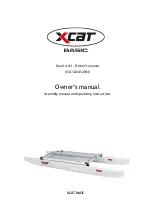Summary of Contents for ARAVIS 17
Page 1: ...1 ...
Page 31: ...31 LINE PLAN ARAVIS ...
Page 34: ...34 CHECKS Name Company Date Signature Stamp ...
Page 36: ...36 ...
Page 1: ...1 ...
Page 31: ...31 LINE PLAN ARAVIS ...
Page 34: ...34 CHECKS Name Company Date Signature Stamp ...
Page 36: ...36 ...

















